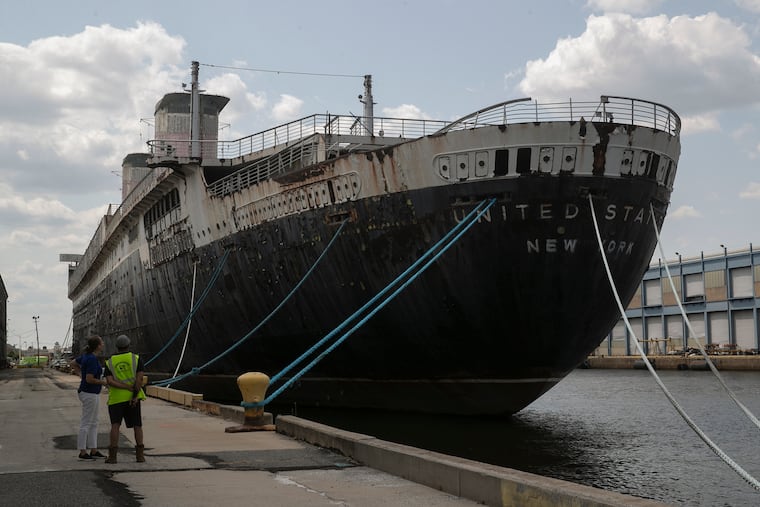The SS United States is in a rent dispute that could leave it without a berth
The SS United States, once known as the “queen of the seas,” has called Pier 82 in South Philly home for about 25 years. A rent dispute with its landlords threatens to leave the ship without a berth.

The SS United States, the luxury ocean liner once known as the “queen of the seas,” appears to be in troubled waters, again. The now-rusty ship could lose its berth at Pier 82 along South Columbus Boulevard, its home since 1996, because of a rent dispute.
It’s the latest sign of distress for what the ship’s caretakers call “a symbol of post-World War II American exceptionalism,” as they struggle to preserve the slice of history that once hosted presidents, royalty, and such celebrities as Marilyn Monroe and Elizabeth Taylor.
Penn Warehousing & Distribution Inc., Pier 82′s landlord, says the SS United States Conservancy, the Washington-based nonprofit caring for the ship, has not paid a rent increase in place since late 2021. Penn Warehousing is seeking the ship’s ejection and back rent in the U.S. District Court for the Eastern District of Pennsylvania.
Filings lay out how both parties entered a berthing agreement in 2011, with the conservancy agreeing to pay $850 a day to stay at Pier 82. Costs stayed flat for more than a decade until Penn Warehousing doubled the daily rent to $1,700 in August 2021, citing rising maintenance costs.
In a counterclaim, the conservancy argues that there was no mechanism in the lease that would allow Penn Warehousing to unilaterally increase the rent. The conservancy says it was given only two weeks’ notice of the increase while its donor tours, a major fund-raising tool, were simultaneously hampered as pier access was closed from August to November of that year due to ongoing repairs. By Penn Warehousing’s account, Philadelphia River Port Authority initiated repairs because of the conservancy’s failure to properly moor or tend the lines to the ocean liner.
After the new rent went into effect, Penn Warehousing said, the conservancy continued to pay the original $850 a day. By March 2022, the landlord decided to terminate its berthing agreement with the conservancy, citing more than $160,000 in back rent that continues to accrue. Penn Warehouse asked the nonprofit to move the vessel, which the conservancy has yet to do.
Lawyers for Penn Warehousing declined to comment on pending litigation. A settlement hearing is scheduled for March. If the parties can’t come to an agreement, a civil jury trial is planned for the fall.
In a statement, the conservancy said it continues “to pursue all available avenues for a mutually agreeable resolution.”
“Forcing our nonprofit organization into a position that imperils the preservation and redevelopment of the SS United States, a historic icon recognized the world over, is not in the country’s interest,” wrote a conservancy representative in an email.
At the time of its 1952 christening, the SS United States was a feat of engineering. It could hold 2,000 passengers and a crew of 1,000. The vessel broke the record for the fastest Atlantic crossing and could transform into a military vessel capable of carrying thousands of troops. The ocean liner’s significance landed it on the National Register of Historic Places.
Still, the conservancy has long struggled to find a way forward for the American-made ocean liner.
Despite its history, the ship was almost sold for scrap in 2010 by its then-owner, Norwegian Cruise Line. The ship was spared that fate when philanthropist H.F. “Gerry” Lenfest — the late former owner of The Inquirer and whose Lenfest Institute now owns the paper — pledged $5.8 million that allowed the conservancy to buy the ocean liner. But by 2015, the conservancy was once again sending an SOS, frantically raising money to avoid the scrapyard. The following year, the possibility of making the ocean liner functional again was ruled out.
The latest efforts to repurpose the ship came in March 2020 when RXR Realty LLC of New York announced plans to turn the ship into a hotel and museum complex. In its 2022 year-end annual appeal to donors, the conservancy said its partnership with RXR Realty continued, without going into specifics.
Should the conservancy have to move the SS United States because of the dispute, it would be no easy feat.
According to court documents submitted by the conservancy, moving the ship would take months to coordinate and cost tens of thousands of dollars. The ship that once broke the transatlantic speed record is now incapable of self-propulsion. The conservancy argues that there’s a shortage of available docks due to the COVID-19 pandemic disruptions, further complicating a sudden move.